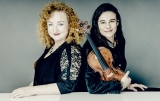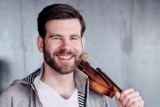Die erste Frage, wenn man sich mit einem Duo unterhält, das in der ungewöhnlichen Kombination Harfe und Klavier musiziert, gilt unweigerlich natürlich der Besetzung und wie es dazu kam. Ich stelle mir vor: Da ist also eine musikalische Familie. Die Mutter spielt Harfe, die Tochter lernt Klavier, wird dann irgendwann richtig gut, wird zu einer ausgebildeten Pianistin. Wie kam es schliesslich zu der ungewöhnlichen Entscheidung, ein Familien-Duo mit der Besetzung Harfe und Klavier zu gründen?
Praxedis Hug-Rütti (PHR): Purer Zufall. Freunde der Familie welche beide Praxedis als Solistinnen kannten, wünschten sich zu ihrem Geburtstagsfest ein gemeinsames Ständchen mit Harfe und Klavier. Nach anfänglicher Überraschung ob der neuen Idee, hingen wir ziemlich in der Luft, da wir keine Ahnung hatten, wie wir die beiden Instrumente als Klangsymbiose zusammenbringen sollten, was wir überhaupt spielen sollen. Read More →
Warum haben Sie die Sonaten von Strauss und Franck für Ihre erste gemeinsame CD ausgewählt?
Wir haben diese beiden Sonaten gewählt, weil sie das repräsentieren, von dem wir glauben, dass wir ihm in diesem Moment unseres künstlerischen Lebens am besten dienen können: technische Herausforderungen, musikalische Vitalität und unendliche Leidenschaft und Energie. Read More →
Wie war die Welt der Musik damals, 1993?
Ich kam aus Albanien, das 50 Jahre lang kommunistisch war. Alles war abgeriegelt, und was draußen passierte, war uns unbekannt. Die Welt der Oper kannte ich durch die italienischen Filme in Schwarz-Weiß, mit den Biografien von Bellini und Verdi. Für mich war das Singen in Italien, an der Scala, ein Traum. Read More →
Wenn man auf die Geschichte des Sinfonieorchesters Liechtenstein blickt, fällt zunächst auf, dass das Orchester mit seinem Gründungsdatum in den 1980er-Jahren im Vergleich zu den Orchestern der umliegenden Länder Schweiz, Österreich und Deutschland ein recht junger Klangkörper ist. Könnten Sie unseren Lesern daher vielleicht zunächst einen kleinen Exkurs der Orchestertradition in Liechtenstein geben: Gab es vor der Gründung gar kein professionelles Sinfonieorchester in Liechtenstein?
EW: Das ist richtig, am 10. September 1988 wurde zunächst das Liechtensteinische Kammerorchester gegründet; mit dem pragmatischen Ziel, den Musikschullehrer/-innen der Liechtensteinischen Musikschule einen eigenen Klangkörper zu bieten. Read More →
Frau Chisson, Frau Atschba, Sie musizieren seit 2008 als Duo zusammen. Wie hat Ihre Zusammenarbeit begonnen, wie haben Sie zueinander gefunden?
LC: Das war drei Jahre nachdem ich mein Studium in Wien angefangen hatte. Tamara hat damals sehr eng mit meiner Professorin Dora Schwarzberg zusammengearbeitet. Als ich eine Demo-DVD mit einem sehr schwierigen Repertoire (Beethoven, Bartok, Lutoslawski, usw.) aufnehmen musste, hat sie zugesagt, dieses Projekt mit mir zu machen. Durch unsere Arbeit im Zusammenhang mit diesen herausfordernden Werken haben wir gespürt, dass es ein besonderes Verständnis zwischen uns gab und ein Potenzial, das wir gern nutzen wollten. Read More →
Die Zeit ohne Livekonzerte hat sich wie eine halbe Ewigkeit angefühlt. Worauf freuen Sie sich jetzt besonders?
Wir sind sehr froh, wieder live zu spielen. Die wenigen Konzerte im letzten Jahr waren ja auch nichts Halbes und nichts Ganzes – nur eine Handvoll Auftritte, wo wir höchstens vor 100 Leuten spielen konnten.
Wie hat sich die Zwangspause angefühlt?
Yuhao und ich sind zum Glück sehr kreative Menschen und sehr flexibel in allem, was wir gemacht haben. Zuerst waren wir frohen Mutes und haben auch viel solidarische Unterstützung von Konzertveranstaltern erfahren, die uns zum Teil Honorare für ausgefallene Konzerte gezahlt haben. Read More →
You were born in St. Petersburg, grew up in Kaunas and now live in New York. To what extent have these places left traces in your compositions?
Places we live in influence our way of being, our communication and the way we relate to others and undoubtedly influence our innermost artistic expression. In my case it is not always easy to trace these influences because altogether they create a mixture… a new entity. Read More →
Ich lebe seit mehr als 17 Jahren in Luxemburg. Von den Anfängen der Philharmonie und der Rainy Days bis heute habe ich den Eindruck gewonnen, dass die (wie auch immer genau definierte) Neue Musik doch beachtlich an Zuspruch gewonnen hat. So wurden die ersten Konzerte von einer Handvoll Zuhörer besucht, die wohl mehr oder weniger aller selber aus dem Metier kamen. Inzwischen ist etwa der Saal Espace découverte in der Philharmonie eher zu klein. Stellt sich die Situation aus Sicht von und für United Instruments of Lucilin auch so dar? Sind weitere Zuwächse zu erwarten oder bleibt Neue Musik trotz allem ein Nischenprodukt?
Sie haben Recht und ich bin froh, dass Sie diesen Zuwachs auch feststellen, denn seit 20 Jahren erleben wir dies mit großer Freude. Es gab sicher in Luxemburg ein Bedürfnis nach Neuem, und auch wenn dieser Zuwachs, das Interesse sich nur langsam entwickelte, tat es dies jedoch stetig und wir stehen seit vielen Jahren mit unseren Zuhörerzahlen genauso gut, wenn nicht besser da als große Städte oder Länder. Read More →
A few years ago, you started your own record label. Why?
You know what? Sometimes I ask myself the same question. Having a record label presents a huge amount of work on top of what I’m doing as a concert violinist. But I think without Audax Records I wouldn’t be able to do all the projects I’m doing – anyway not in this way and definitely not at this speed. My wish is to not only record music, but to draw people closer to the fascinating world of sounds that I care so much about. Read More →
Wie geht es Ihnen in diesen Tagen?
Im Moment findet quasi kein Konzertleben statt. Ich habe auch noch keine Streaming-Konzerte gemacht, jedoch konzentriere ich mich auf meine pädagogische Arbeit am Vorarlberger Landeskonservatorium. Trotzdem hoffe ich sehr, dass es bald wieder Live-Erlebnisse geben wird. Auf jeden Fall zeigt die aktuelle Situation, wie gut es ist, mehrere Standbeine zu haben. Read More →





























